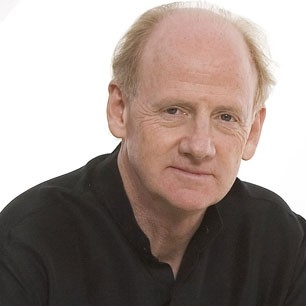
John Ralston Saul’s Dark Return to Fiction
On October 28, Canadian author, essayist and public intellectual John Ralston Saul spoke to a full crowd at the Knox Presbyterian Church as part of the 2012 Ottawa Writers Festival fall line-up. Saul, who is known for his celebrated novels and essays, being twice elected as the President of PEN International, and his marriage to former Governor General Adrienne Clarkson, came to the Writers Festival to speak about literature, Canadian and global politics, and his newest novel, Dark Diversions: A Traveller’s Tale (Viking Press Canada), his first fictional work in nearly two decades. After his appearance at the festival, Ottawa Life Magazine got a chance to talk with Saul about his new book and his thoughts on the role of the writer.
Speaking about his hiatus from the world of fiction, Saul said he’s “always had these ideas about Canada and I needed to write them,” but they could not be expressed in fictional form. Through his essays and non-fiction books, Saul found himself in a period of transition from “writing novels to influence people” to “explaining ideas” directly to his audience. Saul described his earlier non-fiction works, like Voltaire’s Bastards (1992) and Reflections of a Siamese Twin (1997) as “half critique and half proposition,” while his later works, like On Equilibrium (2001) and A Fair Country: Telling Truths about Canada (2008), offered him a chance to share more singular arguments about his own propositions for Canada and the world. Saul believes his essays and the open discussions he’s held have “opened a door for the return of the oral argument,” an art form that helped define Canada throughout its history, but has nearly been lost in the present day.
To Saul, fiction and non-fiction writings are part of the big puzzle. “Philosophy has always been like fiction . . . [because] novels contain the ultimate truth.” For this reason, Saul has always seen himself as a novelist first and foremost. “Every day of my life, I think that I need to be writing novels. Eventually, I felt it was the right time to come back to the novel, which unlike non-fiction, allows you to create this world that people can find themselves in.”
During his absence from the world of fiction, Saul became president of PEN International, a global community of writers who promote freedom of speech and help free imprisoned journalists and authors. Through his role as PEN president, Saul has travelled the world and worked with publicists, academics, prominent writers and world leaders to promote the organization’s cause and raise awareness and sympathy for unjustly incarcerated writers.
Through his travels, witnessing a wide variety of social spheres and community classes, Saul found the inspiration for many of the characters in Dark Diversions, his first fictional work in 15 years. The narrator, whose name and identity are left unknown through most of the book, chronicles a series of stories while he moves among aristocrats in America, elites in Europe, and dictators in the developing world. He chronicles the passion, malaise, depression and self-destruction of the upper classes as he witnesses murder, infidelity, attempted suicide, the double lives and broken lives of the privileged persons and plutocrats in the highest echelons of society.
 Dark Diversions is in part a continuation of the themes of Saul’s last novel, De si bons Américains, a black comedy about elites. Saul didn’t think Dark Diversions “would be so dark” when he started writing it, but the book’s use of composite and pastiche characters based on real-life personalities Saul has encountered led to the dark comic and ironic tones that reflect the present era. “I like black comedy,” Saul said. “[Dark Diversions] is funnier and darker because this is an era for dark comedy. When you look at something like the recent financial crisis and how the very people who started the entire collapse were rewarded for what they did – that’s comedic in a very dark way.” Saul believes that while events like the economic crisis of 2008 are not funny in a serious way, they are in part “comically serious.”
Dark Diversions is in part a continuation of the themes of Saul’s last novel, De si bons Américains, a black comedy about elites. Saul didn’t think Dark Diversions “would be so dark” when he started writing it, but the book’s use of composite and pastiche characters based on real-life personalities Saul has encountered led to the dark comic and ironic tones that reflect the present era. “I like black comedy,” Saul said. “[Dark Diversions] is funnier and darker because this is an era for dark comedy. When you look at something like the recent financial crisis and how the very people who started the entire collapse were rewarded for what they did – that’s comedic in a very dark way.” Saul believes that while events like the economic crisis of 2008 are not funny in a serious way, they are in part “comically serious.”
Saul took many real-life individuals he had met and transformed them through the novel. “I used, and I don’t want to call it the ‘lens’ of fiction, but more of the ‘metamorphosis’ or transformation, if that makes any sense. You can tell stories about real people, but through the transformation of fiction, you can really see them. It’s hard to explain, but you can see things entirely differently in fiction.”
Dark Diversions is in many ways a call-back to the early days of modern fiction. “I’ve always believed that the beginning of modern fiction is (Joseph) Conrad. In Heart of Darkness and many of his other works, the narrator is caught… being the witness and not knowing what to do about it. Dark Diversions is in part a picaresque, as the narrator tumbles into disorder, wandering through the different events of the novel.” Yet Saul’s anonymous narrator struggles with his place among the desperate and melancholic people he encounters and what he chronicles starts to affect him in tangible ways. The trials of the narrator reflect Saul’s own thoughts on how the author and the novel should interact. “Novels are driven by something… very muscular in society. When you’re writing a novel, you can’t just rely on the character of the narrator driving the novel.” To Saul, “a good novel allows you to enter in and control a world,” while the novelist disappears to allow the reader to experience the reactions of the characters personally.
In Dark Diversions, Saul’s narrator attempts to stay distant from the people he encounters, taking the time to observe but rarely interfere with the lives of the rich and influential. Saul wrote his narrator to be more distanced partially in reaction to what he saw as a growing trend in contemporary fiction in which the narrator is presented as more important than the plot. Saul saw many instances where the author uses the character of the narrator for wish-fulfilment purposes, in both detective novels and serious fiction. To Saul, this trend of the authors confusing themselves with their narrators and personally intervening in the events of the novel is very “pornographic.”
“I never liked novels where the author gets in the way… the author takes readers to a place to peek in on the action, without any consequences. I believe the author should take the reader to a place to go in and feel those consequences.”
Saul thinks authors invade their works in fiction and non-fiction. “There is a big confusion about how do you establish what truth is, and in non-fiction, many authors try to marshal facts to prove things; this doesn’t answer the real, big questions because you can prove almost anything with facts.” Saul believes that in relying solely on facts, writers create what he calls a “false neutrality,” where the author attempts to look unbiased, but still displays a prejudice through the information that is presented. “I believe an argument has to hold its own. Facts are just illustrations. I don’t rely on facts in my writing, but I still use them. In writing non-fiction, you have a role of getting the reader to think about how ideas work, not just telling them how to think.
To Saul, fiction and non-fiction writing is an important part of being human. “I don’t think novels and essays are that different. (A book) is the most powerful weapon. The first time a child discovers he or she is an individual is by reading a novel.” The biggest threat to a person’s identity is the removal of those works and the silencing of the freedom of expression that comes through writing.
As President of PEN International, Saul has been working tirelessly to promote freedom of expression on a global scale. PEN is  currently working on the Declaration on Free Expression and Digital Technology, which will be released shortly. The Declaration is an attempt to generate a consensus among writers and governments about restrictions imposed on online interactions. “The digital world has created all sorts of opportunities, but we’ve seen an explosion in government security forces observing people through the digital domain.” In many countries, governments do not need judicial permission to obtain private information online and use it to convict and imprison their own people. “Governments are now getting an enormous amount of detail without this permission. We’re seeing this all the time with people constantly prosecuted over what is digitally published.”
currently working on the Declaration on Free Expression and Digital Technology, which will be released shortly. The Declaration is an attempt to generate a consensus among writers and governments about restrictions imposed on online interactions. “The digital world has created all sorts of opportunities, but we’ve seen an explosion in government security forces observing people through the digital domain.” In many countries, governments do not need judicial permission to obtain private information online and use it to convict and imprison their own people. “Governments are now getting an enormous amount of detail without this permission. We’re seeing this all the time with people constantly prosecuted over what is digitally published.”
Saul and PEN are very concerned about the dangers that could arise if the restraints on what governments should have access to go unchecked. “If you look at the victories that have been won for freedom of expression in the last 100 years, most of them have been lost in the past 20. The question needs to be asked, ‘Do we have to have rules to define what is acceptable and unacceptable?’ and [the Declaration] is an attempt to do that.”
Saul cited the example of Liu Xiaobo, who won the Nobel Peace Prize in 2010 for his defence of human rights in China and was imprisoned for his activism. The defence of his cause on the internet, as well as any online mentions of him or his work, have been entirely censored in China. Xiaobo’s imprisonment is not only an example of the repression of free speech, but of the failure of the Chinese government to address the nature of digital publication. “You need to read the case [against Xiaobo] to see how the Chinese government interprets what it thinks the internet is,” Saul noted. “We aren’t just defending journalists, authors and members of PEN anymore. Whether you’re a Nobel Prize winner or a volunteer announcer at a community radio station, and everything in between, we are here to defend your rights.” One of the most important things is for PEN to “not be divided by authorities attempting to make judgments on what a bona fide writer is.”
Saul firmly believes that free expression is not simply exercised by writers. “Freedom of expression belongs partly to the writer and partly to the reader. When you read something out loud or share it with friends, that is an example of freedom of expression.”
John Ralston Saul’s new book, Dark Diversions: A Traveller’s Tale, is available now in bookstores everywhere.





